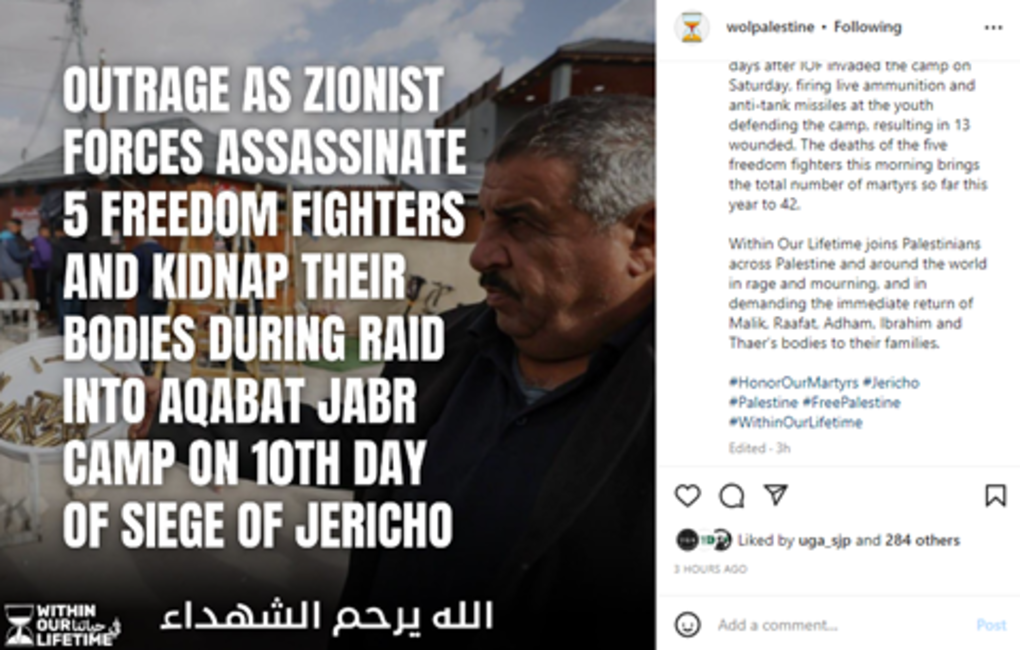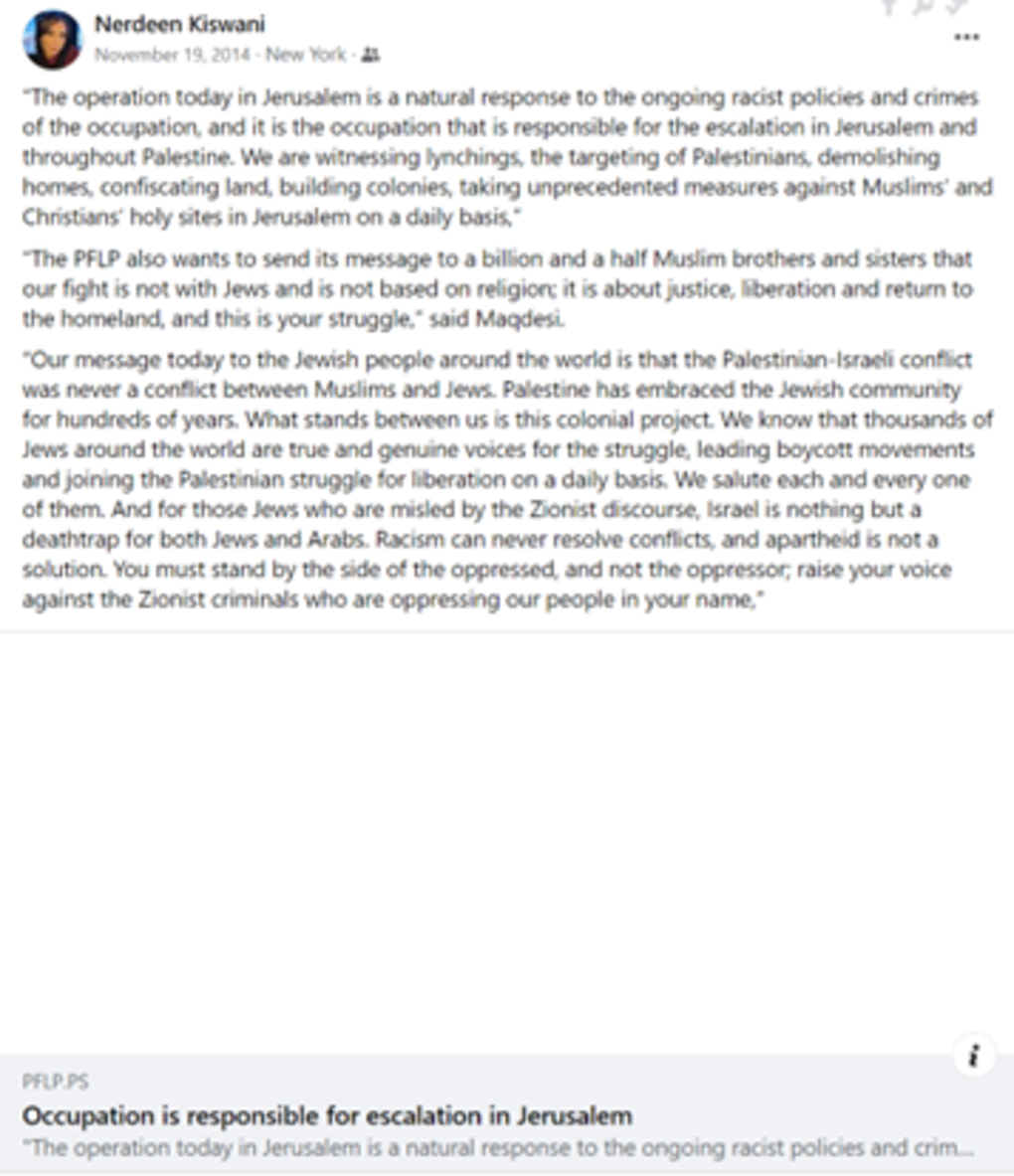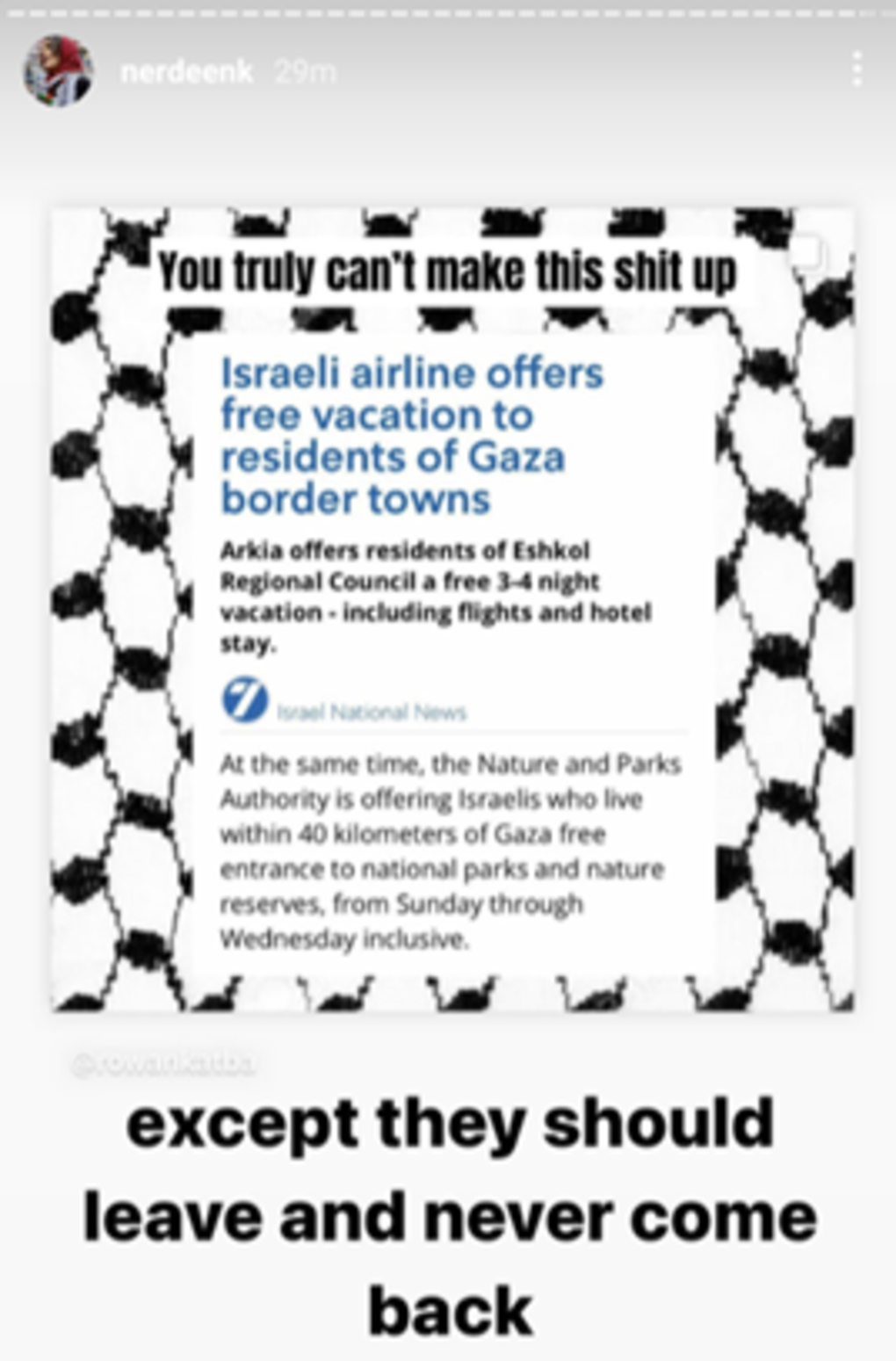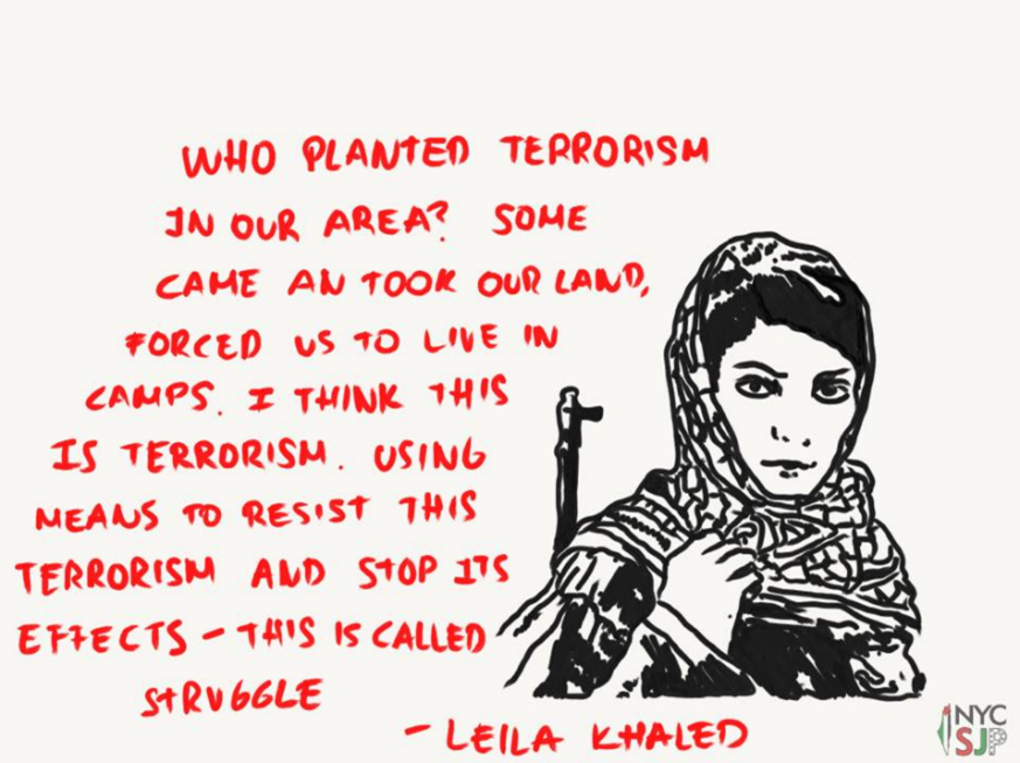22.06.23
Editorial Note
After numerous accusations of antisemitism, some pro-Palestinian campus advocates became vocal in stressing that their critique was merely anti-Zionist. However, according to the International Holocaust Remembrance Alliance (IHRA), the widely-accepted definition of antisemitism, there are clearly antisemitic elements in their activities. In addition to the usual charges of apartheid and colonialism, advocates took to describing those who disagreed with them as “Zionists.”
In March, George Washington University’s chapter of Students for Justice in Palestine (GW SJP) launched the annual Israeli Apartheid Week (IAW) to “combat the university’s ongoing discrimination and suppression of the Palestinian community.” The IAW began with a teach-in, “Confronting Zionism,” that partnered with the Palestinian Youth Movement’s local chapter to help students “resist Zionism on campus.” SJP also set up an apartheid wall, calling for “land back.” Laila, an organizer from GW SJP, said the university “is an incredibly Zionist campus in multiple facets… GW is a very Zionist campus.” The administration is “particularly open about their support for Zionism.” GW also prevented SJP from receiving funds as a student organization. GW SJP believes such actions “make the university complicit in the larger system of Israeli apartheid and settler-colonialism.”
Other protest activities have the same flavor. On Dec 4, 2022, Counterculture Magazine at the University of Richmond (UR) published an article titled “Palestinian Activism on College Campuses.” It detailed how in late 2022, a protest at GWU, led by GW SJP and GW Jewish Voice for Peace, took place outside an event of GW for Israel and GW Hillel groups. The pro-Palestinian students protested a talk by Doron Tenne.” an IDF officer during the First Intifada. The protesters charged that “thousands of Palestinian people were killed during a series of mass protests against the Israeli occupation.”
In other incidents, for example, in late 2022, the University of Maryland’s (UMD) SJP issued a statement regarding a speaker event for Israel Studies on campus. The speaker was Ambassador Michael Herzog, a former general in the IDF. The UMD SJP stated that the IDF “subjugate and ethnically cleanse Palestinians from their ancestral homelands.”
In the academic year 2021-2022, students at the UR established their own chapter of SJP. Razan Khalil, one of the leaders of the effort, vigorously rejected any accusations of antisemitism, ”UR’s chapter has been critiqued constantly for antisemitism while in its mission statement, it simply calls for more awareness about the injustices that Palestinian people face in their homeland. Seeing as opposition to Palestinian activism is present on many campuses, it is clear that there is a distinct pattern of discrimination against Palestinian people as a whole in the administration of many higher education institutions. What is quite interesting is that while Palestinian activist organizations call out the actions of other organizations that may promote the ongoing systemic oppression of Palestinian people worldwide, they oftentimes experience more repercussions than the organizations promoting the ethnic cleansing of Palestine in their choices of events and speakers themselves.”
The pro-Palestinian activists argued that GWU SJP’s protest “elicited a response from the President insinuating that the rhetoric of the protest was discriminatory and therefore needed to be condemned, yet no higher administrative official spoke up about the fact that organizations at the University were hosting speakers that directly contributed to the deaths of innocent Palestinian people. When actions like these add up on a college campus, they promote a subtle message about how little many higher education institutions care about the human rights of Palestinian people, and what lengths they will go to in order to ensure that Palestinian activism is met with vitriol.”
Moreover, for pro-Palestinian activists on campus, the “conflation of antiZionism and anti-semitism… is most certainly present on college campuses. With that conflation comes the restriction of activists’ rights to speak up about the atrocities committed by the state of Israel. It simply does not make sense to acknowledge freedom of speech and then explicitly deny it to a group of people on the false claim of religious discrimination.”
Pro-Palestinian activists claim that they are accused of antisemitism falsely. They pointed out the case of Nerdeen Kiswani, a Law student at CUNY who was described as the “Antisemite of the Year” by the Anti-Defamation League (ADL). They noted “what happened to student Nerdeen Kiswani, who was labeled as antisemite of the year by stopantisemitism.org. Her college eventually had to step in and issue a statement advocating for the protection of the right to free speech.”
However, the ADL published in February a report that described Kiswani as an anti-Israel activist and co-founder and leader of Within Our Lifetime-United for Palestine (WOL), a radical New York-based anti-Israel organization that routinely expresses support for violence against Israel. Kiswani’s antisemitism is clearly expressed via her expressions of extreme anti-Zionist rhetoric, including her calls for all ‘Zionists’ to be vilified and expelled from community spaces, as well as her support for indiscriminate violence against Israel aimed at the country’s dissolution.” Kiswani and her organization “explicitly call for the complete eradication of Israel, including for Israel to be ‘wiped off the map,’ and have called for Israeli Jews to leave the country” WOL and Kiswani expressed support for acts of terror perpetrated by terror groups such as the Popular Front for the Liberation of Palestine (PFLP). On several occasions, Kiswani and WOL have “promulgated classic antisemitic tropes, including those related to ‘Zionist’ control over media and politics.”
In February 2023: when five Hamas members were killed in an Israeli military operation in Jericho, WOL shared an image declaring them “freedom fighters,” stating that the organization was “in rage and mourning.” In November 2014: Following a PFLP shooting in a Jerusalem synagogue, Kiswani shared PFLP’s statement justifying the act of terror as a “natural response” to Israeli actions. in 2022: Kiswani shared a meme reading: “Little Miss telling everyone Israel is[sic] will be wiped off the map inshallah [God willing].” In 2022: Responding to a news story about free vacations to Israelis who live near the Gaza Strip, Kiswani commented that those Israelis should “leave and never come back.” In November 2022, in an appearance on the Iranian news channel Press TV, Kiswani said, “Resistance is the only way.”
On numerous occasions, Kiswani and WOL have shared materials venerating PFLP and Leila Khaled, one of the hijackers of two civilian airliners, TWA Flight 840 in 1969 (from Rome to Tel Aviv) and El Al Flight 219 in 1970 (from Amsterdam to New York City). In September 2016, WOL shared an image of Leila Khaled carrying a rifle alongside a quote justifying violence. In 2017 WOL posted a Facebook post, “From occupied Palestine to Hollywood, israel’s dogs of war find lucrative positions upholding imperialism, sexual violence and misogyny.” In July 2015, Kiswani advertised an event on Facebook: “Please be here tomorrow if you can! It’s the same story of zionists using their political clout to get away from being held accountable for hate based crimes while ironically accusing others of what they have done.” Kiswani personally led chants of “Zionism out of CUNY.” Kiswani has expressed happiness that some places have become “toxic and unwelcome” for “Zionists.” She called Zionists “complete scum.” In March 2017, she wrote, “Im so happy feminism and feminist movements have created a toxic and unwelcome environment for Zionists.” In June 2022, WOL tweeted, “Zionism has no place in CUNY. Attempts to silence us only make us stronger! #ZionismOutOfCUNY.” WOL suggested chants, “Say it loud say it clear, we don’t want zionists here.” In July 2014, Kiswani wrote, “Any person who supports Israel in any way shape or form Any person who apologizes on behalf of Israel Any person who identifies as a Zionist in any way shape or form Is complete scum… Israel as a state needs to be dismantled. It needs to go.”
The above incidents represent the conflation of pro-Palestinian activists and antisemitic sentiments on campus per the IHRA Definition of Antisemitism. They negate the Jews’ right to self-determination and aspire to annihilate the Jewish state.
References:
George Washington University Students Battle Zionist Bullying on Campus
PRIYA ARAVINDHAN NORTH AMERICA POSTED ON JUNE 2, 2023
Washington Report on Middle East Affairs, June/July 2023, pp. 30-31
Special Report
By Priya Aravindhan
IN THE LAST WEEK of March, George Washington University’s chapter of Students for Justice in Palestine (GW SJP) launched Israeli Apartheid Week (IAW) to combat the university’s ongoing discrimination and suppression of the Palestinian community.
The week began on March 27 with a teach-in, “Confronting Zionism.” GW SJP partnered with the Palestinian Youth Movement’s local chapter to help students identify and resist Zionism on campus. In the following days, students held various events, such as a dabke workshop and “A Night in Palestine” cultural celebration.
Throughout the week, SJP set up and maintained an apartheid wall with resistance art and calls for “land back.” IAW culminated in a rally on the school’s Kogan Plaza on March 31, in which various students formed a united front against the university’s ongoing oppression of Palestinian and anti-Zionist students and faculty.
This year’s IAW came at a time when Palestinian identity is becoming increasingly targeted by GW’s administration. A month prior to IAW, GW professor Dr. Lara Sheehi was wrongfully accused of discriminating against Jewish students by StandWithUs, a right-wing pro-Israel activist group. The university cleared Sheehi of all charges. In a statement, the Office of the University President said those bringing the charges “advocated for an expansive view of the definition of anti-Semitism, which, if accepted in the university environment, could infringe on free speech principles and academic freedom.”
Despite this favorable ruling, many feel GW remains a hostile place for Palestinians. Laila, an organizer from GW SJP, said the university “is an incredibly Zionist campus in multiple facets” and that the administration is “particularly open about their support for Zionism.” (The student, like others quoted in this article, wished to remain anonymous due to fears of being slandered by pro-Israel groups, such as Canary Mission, that regularly target those advocating for Palestine on campus.)
Indeed, in 2021 the university removed counseling services for Palestinian students experiencing trauma as a result of Israeli violence due to complaints from a pro-Israel group. The school was later reprimanded by the District of Columbia’s Office for Human Rights for discriminating against Palestinian students. The academic institution has also prevented SJP from receiving funds as a student organization.
GW SJP believes such actions make the university complicit in the larger system of Israeli apartheid and settler-colonialism. “GW’s administration continually puts obstacles in front of the work we’ve been doing,” Laila said.
Last year, SJP held a postering event to protest GW Hillel for inviting Doron Tenne, a former senior intelligence officer in the Israeli military, to speak on campus. In response to a poster pasted on GW Hillel’s bench, the university administration claimed vandalism and threatened SJP with censure and its president with disciplinary probation. The charges, however, were false, as neither the president nor the organization was responsible for the poster pasting, as the university ultimately conceded.
Supporters of Palestine are disinclined to applaud the administration for dismissing accusations in this and other cases. “Our success doesn’t really have to do with the administration,” Laila said. “It is very much a response to the organizing of our community members and the solidarity of our partners.” They pointed to other GW organizations, regional SJP groups and national political groups as being particularly vocal in defending GW SJP from spurious attacks.
“GW is a very Zionist campus,” George, another SJP organizer said, “but there is a lot of silent support for Palestine.” People are often cautious to publicly mobilize for the Palestinian cause “due to certain risks that come with things like your career being threatened or being doxxed online,” he added.
One important event from IAW was the panel “The Palestine Exception,” which discussed the academic suppression of Palestinian and pro-Palestinian voices. Dr. Sheehi, Palestine Legal attorney Dylan Saba and Palestinian GW professor William Youmans spoke on the work they have been doing around Palestine for decades. “It was amazing to see our place within the larger movement for Palestine by seeing how the student movement has evolved,” George stated.
IAW not only served as a time to build a stronger united front against oppression, but also as a safe space for people to speak out against Israeli apartheid and show unapologetic support for Palestine. “We want to show people that there is a place on campus to demonstrate support for Palestinian liberation,” one student said. “We’re here and we’re not going to back down no matter what.”
“Our goal was to engage with people who have never really engaged with Palestine and to consolidate the Palestinian community on campus and create a week for them to celebrate our culture and our resistance,” one organizer expressed. “IAW is a time when we can be extra visible on campus.” With the apartheid wall and numerous cultural and academic events, GW’s SJP successfully asserted their presence on campus and their ongoing resistance to the systems that work against them and all Palestinians.
Priya Aravindhan is a rising senior studying anthropology and international affairs, with an interest in the Middle East and South Asia, at The George Washington University. She interned for the Washington Report this spring.
=====================================
Issue Two of Counterculture Magazine, the University of Richmond’s first publication to focus exclusively on social justice issues.
https://issuu.com/counterculturemagazineur/docs/counterculture_magazine_issue_two.pptx/s/17769539Palestinian Activism on College Campuses
from Counterculture Magazine Issue Two
On October 11, 2022 at George Washington University, a protest led by GW Students for Justice in Palestine and GW Jewish Voice for Peace organizations occurred outside of an ev ent being hosted by the GW for Israel and GW Hillel groups.
The event was called “A Conversation with Doron Tenne.” Doron Tenne held various positions within the Israeli Defense Force during a period known as the First Intifada, when over 2,000 Palestinian people were when thousands of Palestinian people were killed during a series of mass protests against the Israeli occupation of the West Bank and Gaza).
In response to the protest, both GW for Israel and GW Hillel issued statements. GW Hillel’s statement read that the protests “[limited] the ability of our Jewish students to freely learn,” calling the behavior of the protesters “aggressive action.” GW Jewish Voice for Peace responded in their statement that the specific wording of GW Hillel’s statement “[asserted] that the protest targeted Jewish students and the Jewish community on campus at large” when in reality, it “perpetuates the conflation of antiZionism and anti-semitism.” The President of George Washington University also released a letter to all students following the protest, but did not specifically address the event itself or the fact that a former IDF official was being hosted.
George Washington University is only one of many universities where Palestinian activism groups have protested hosting speakers that were directly involved in the oppression of Palestinian people. On October 27, 2022, the University of Maryland’s Students for Justice in Palestine issued a statement regarding a speaker event being hosted by the Joseph and Alma Gildenhorn Institute for Israel Studies on campus. The speaker was Ambassador Michael Herzog, a former general in the Israeli Defense Forces. UMD Students for Justice in Palestine stated that the purpose of the Israeli Defense Forces was to “subjugate and ethnically cleanse Palestinians from their ancestral homelands,” which was their purpose for opposing the event.
As Palestinian activism continues to gain traction on college campuses, concerns about the safety of the students openly participating in the cause rise. On George Washington’s campus, members of GW Hillel leadership argued in their statement that the protest regarding the Doron Tenne event crossed a line threatening the safety of Jewish students. This argument is a symptom of a larger debate occurring on many college campuses: are openly anti-Zionist events and protests inherently antisemitic? Many members of Students for Justice in Palestine chapters respond that they are not; in fact, these members point out that mistaking anti-Zionism for antisemitism is the teal problem, as while some definitions of Zionism state that it is the belief in the development and protection of the Jewish state in Israel, antisemitism is the systemic oppression of Jewish individuals.
On some college campuses, such as the campus of the University of New York, students engaging in Palestinian activism have to think about their actions strategically to protect their academic and professional standing. Some students worry about being listed on the website of the Canary Mission, which lists pro-Palestine students and calls them out for supposedly being anti-semitic. Others worry about campaigns being set up to besmirch their name and prevent them from navigating their campus or job safely.
This was exactly what happened to student Nerdeen Kiswani, who was labeled as antisemite of the year by stopantisemitism.org. Her college eventually had to step in and issue a statement advocating for the protection of the right to free speech.
For some pro-Palestine activists, the threats go so far as to alert the FBI, leading to interrogations that are prompted by their names being on the blacklists of some pro-Israel organizations such as the Canary Mission. All evidence points to an undebatable truth: students advocating for the freedom of Palestine are not necessarily safe on their campuses. They often engage in activist efforts at the expense of their own security.
Students at the University of Richmond established their own chapter of Students for Justice in Palestine in the 2021-2022 academic year. Razan Khalil was at the forefront of this effort, and they mentioned several roadblocks that they experienced while trying to get the club approved. Many of these roadblocks reflected those that the Students for Justice in Palestine chapters at George Washington University and the University of Maryland faced. During the year, Razan had to meet with a committee three times and was “‘interrogated’ on whether Students for Justice in Palestine was exclusive toward Jewish students, whether [it] was antisemitic, and whether [it] would directly target Israeli students.”
Reportedly, one of the members of the committee said that they couldn’t believe the University was allowing such an “antisemitic organization” on campus after one of several meetings with Khalil.
One of the recent events hosted by UR’s Students for Justice in Palestine chapter was a virtual discussion with Dr. Angela Davis, world-renowned scholar and author of Freedom is a Constant Struggle. In an effort to curate a list of questions that students had for Dr. Davis, a form was released online for submissions prior to the event. In this form, Khalil noted that some questions that were submitted seemed to target Students for Justice in Palestine, which was a complete antithesis of the purpose of the event itself. This was only one of many instances of questioning that Students for Justice in Palestine has experienced on campus since its founding, as noted before. Just as on other campuses, UR’s chapter has been critiqued constantly for antisemitism while in its mission statement, it simply calls for more awareness about the injustices that Palestinian people face in their homeland.
Seeing as opposition to Palestinian activism is present on many campuses, it is clear that there is a distinct pattern of discrimination against Palestinian people as a whole in the administration of many higher education institutions.
What is quite interesting is that while Palestinian activist organizations call out the actions of other organizations that may promote the ongoing systemic oppression of Palestinian people worldwide, they oftentimes experience more repercussions than the organizations promoting the ethnic cleansing of Palestine in their choices of events and speakers themselves.
As seen at George Washington University, Students for Justice in Palestine’s protest elicited a response from the President insinuating that the rhetoric of the protest was discriminatory and therefore needed to be condemned, yet no higher administrative official spoke up about the fact that organizations at the University were hosting speakers that directly contributed to the deaths of innocent Palestinian people. When actions like these add up on a college campus, they promote a subtle message about how little many higher education institutions care about the human rights of Palestinian people, and what lengths they will go to in order to ensure that Palestinian activism is met with vitriol.
Another point is to be made about the freedom of speech argument that some organizations will utilize to target pro-Palestine students.
Many of these organizations insist that while students are entitled to freedom of speech, openly criticizing the Israeli government and military for the death of so many Palestinian people is directly correlated with the targeting of all Jewish students on campus. This line of thinking suggests that the conflation of antiZionism and anti-semitism that GW Jewish Voice for Peace addressed in their statement is most certainly present on college campuses.
With that conflation comes the restriction of activists’ rights to speak up about the atrocities committed by the state of Israel. It simply does not make sense to acknowledge freedom of speech and then explicitly deny it to a group of people on the false claim of religious discrimination.
That being said, members of UR’s Students for Justice in Palestine chapter still express hope about the future of their cause. Khalil noted that “with every chapter they have seen, the resistance is met with the support of many,” meaning that an organized collective of students and community members is always ready to defend the organization when accusations of antisemitism begin. However, it is important to note that there are still concerns about the safety of pro-Palestine activists on college campuses such as UR’s, given that GW’s Students for Justice in Palestine chapter is now facing disciplinary charges because of their protest against the Doron Tenne event.
George Washington University charged the organization with misconduct, and a Palestine Legal attorney representing Students for Justice in Palestine rightfully responded to the charge with a poignant statement: “SJP followed all the rules around postering and directed their members and allies to do the same. But GW is selectively targeting this group for punishment, when there is zero evidence of any wrongdoing. This looks like racist, anti-Palestinian profiling and the law does not support it.”
When legality enters the conversation, it becomes obvious that the rights of pro-Palestine activists on college campus are actively being challenged at every level. It just goes to show that Palestinian activism on UR’s campus is likely to continue facing criticism and opposition at every turn, meaning that awareness about the cause must be circulated constantly in order to protect those openly engaging with it.
***
Editor’s Note: This article has undergone revision for clarity. (December 2022)
========================================================
https://www.adl.org/resources/blog/nerdeen-kiswani-and-within-our-lifetime-united-palestine-what-you-need-know
Nerdeen Kiswani and Within Our Lifetime-United for Palestine: What You Need to Know
Published: 03.02.2023
From: Center on Extremism
• Nerdeen Kiswani is an anti-Israel activist and co-founder and leader of Within Our Lifetime-United for Palestine (WOL), a radical New York-based anti-Israel organization that routinely expresses support for violence against Israel.
• Kiswani’s antisemitism is clearly expressed via her expressions of extreme anti-Zionist rhetoric, including her calls for all “Zionists” to be vilified and expelled from community spaces, as well as her support for indiscriminate violence against Israel aimed at the country’s dissolution.
• Kiswani and WOL (founded in 2015) organize rallies in New York City that have drawn thousands of attendees, including events outside the Israeli consulate and pro-Israel organizations such as the Jewish National Fund (JNF).
• Kiswani and her organization explicitly call for the complete eradication of Israel, including for Israel to be “wiped off the map,” and have called for Israeli Jews to leave the country (both from the West Bank and in Israel proper).
• WOL and Kiswani frequently express support for acts of terror perpetrated by U.S.-designated terror groups, including the Popular Front for the Liberation of Palestine (PFLP).
• Kiswani habitually asserts that all Zionists, including American Jews who support Israel, are inherently bigoted and should be ostracized.
• On several occasions, Kiswani and WOL have promulgated classic antisemitic tropes, including those related to “Zionist” control over media and politics.
• Kiswani has been platformed by leftist outlets, including Haymarket Books.
• Kiswani became widely known after she delivered a May 2022 commencement speech for CUNY Law in which she excoriated “Zionists” and condemned “normalizing” trips to Israel.
Promotion of violence, terrorism and removal of Israelis from Israel
Kiswani and WOL express full, unabashed support for all forms of “resistance” against Israel, regardless of the brutality of the violence. On social media, she and WOL make their veneration of violence against Israelis clear:
• February 2023: After U.S. State Department-designated terror organization Hamas claimed as members all five Palestinians killed in an Israeli military operation in Jericho, WOL shared an image declaring them “freedom fighters” and that WOL was “in rage and mourning.”

• November 2014: Following a PFLP shooting and meat cleaver attack that killed four worshippers in a Jerusalem synagogue, Kiswani shared PFLP’s statement justifying the act of terror as a “natural response” to Israeli actions.

• 2022: Kiswani shared a meme on her Instagram account reading: “Little Miss telling everyone Israel is[sic] will be wiped off the map inshallah [God willing].”

• 2022: Responding to a news story about an airline offering free vacations to Israelis who live near the Gaza Strip, Kiswani commented that those Israelis should “leave and never come back.”

• November 2022: In an appearance on the Iranian government-backed news channel Press TV, Kiswani said, “Resistance is the only way” and that no political process remains that will result in Palestinian liberation.
• On numerous occasions, Kiswani and WOL have shared materials venerating PFLP and one of its leaders, Leila Khaled, known for her role in the hijacking of two civilian airliners, TWA Flight 840 in 1969 (bound for Tel Aviv from Rome) and El Al flight 219 in 1970 (traveling from Amsterdam to New York City). In September 2016, WOL shared an image of Leila Khaled carrying a rifle alongside a quote justifying violence.

• March 2022: For International Women’s Day, WOL posted a collage containing images of at least three women who have engaged in terrorism against Israel, including Leila Khaled and Rasmea Odeh.
Historic/Classic Antisemitic Tropes
On at least four occasions, Kiswani and WOL have used social media to share classic antisemitic tropes related to alleged Israeli and “Zionist” control or nefarious influence over Hollywood, sexual violence against women, politics, media and more.
• 2017: WOL Facebook post: “From occupied Palestine to Hollywood, israel’s[sic] dogs of war find lucrative positions upholding imperialism, sexual violence and misogyny.”
• 2016 WOL Facebook post: “When the vast majority of politicians in the US are bought off by the zionist [sic] lobby, talk is cheap.”
• July 2015: On Facebook, Kiswani advertised an event: “Please be here tomorrow if you can! It’s the same story of zionists[sic] using their political clout to get away from being held accountable for hate based crimes while ironically accusing others of what they have done…”
• 2013: Kiswani shared a quote on Facebook that included: “Despite the almost total control of the major media conglomerates by Global Zionism, the advocates of pro-Palestine are winning the war on social medias[sic].”
Calling for Shunning of “Zionists”
Kiswani personally led chants of “Zionism out of CUNY” as she protested outside the university during her time as a student activist. “Zionism out of CUNY” can be viewed as an antisemitic call against the Jewish community at large, as the vast majority of American Jews identify as Zionist or consider a connection to Israel to be integral to their social, cultural or religious identities. Kiswani has also expressed joy that some spaces have become “toxic and unwelcome” for “Zionists.” In other commentary, she has called Zionists “complete scum.”
• March 2017: “Im[sic] so happy feminism and feminist movements have created a toxic and unwelcome environment for Zionists”

• June 2022: WOL tweet: “Zionism has no place in CUNY. Attempts to silence us only make us stronger! #ZionismOutOfCUNY”
• The WOL website lists among its suggested chants for anti-Israel rallies: “Say it loud say it clear, we don’t want zionists here”

• July 2014: “Any person who supports Israel in any way shape or form Any person who apologizes on behalf of Israel Any person who identifies as a Zionist in any way shape or form Is complete scum[sic]… Israel as a state needs to be dismantled. It needs to go.”